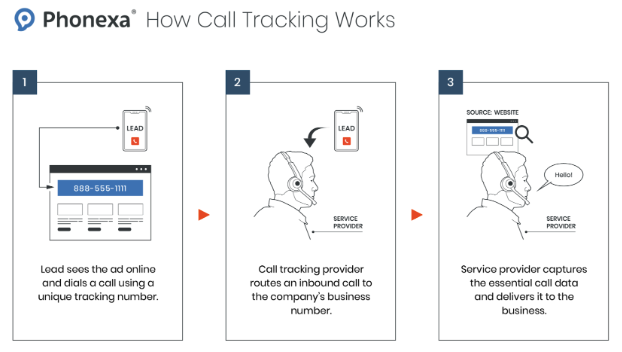Technology keeps advancing and hence companies try to come up with novel approaches to familiarize with the customers and fulfill their needs. Call tracking software lets companies change customer interactions by offering inbound call data in great detail.
Look for patterns in call data that would expose ways to increase service. It is really important to know how to choose call tracking software. In addition, the data-driven approach enables leadership with metrics to help In decision-making. This article examines the process of deploying call-tracking tools to enable companies to transform their customer’s experience by providing actionable insights. Implementing an appropriate strategy will enable enterprises to capitalize on call analytics and build deep-seated relationships that lead to steadfastness and expansion.
What Is Call Tracking and How Does It Work?
Call tracking gives businesses a chance to obtain important information about customer interactions through their phone numbers. This works by allocating a different contact number to every brand channel, such as Google Ads, billboards, or social media. If a customer calls any of the numbers, a business can track the source that led to this call.

The SaaS call center solutions are the cloud platforms that give businesses the tools and the infrastructure to manage customer conversations effectively. These best call tracking solutions have a complete package features comprising live call tracking, analytics, and real-time monitoring among others, thus making the services smooth and efficient.
The call tracking metrics offer each ad source a given phone number. These numbers have been set up to forward any calls made to them to the business main phone number. Each unique call tracking number is connected to a particular channel ensuring that when a call comes in, the company can determine precisely from which channel the caller accessed the phone number.
For example, a company may have one phone number for their Google Ads, another for Facebook ads, and another for radio spots. If a customer calls the Google Ads number, the company will know that their Google Ads generated that call. They can then use this information to optimize their advertising spend by focusing on channels that drive the most calls and leads.
Cooperating with the best call tracking company offers multiple benefits for customer service and marketing teams:
- Gain visibility into which marketing channels generate calls. Businesses can optimize their ad spend by focusing on high-performing channels.
- Improve the customer experience. Knowing the source of a call allows agents to personalize the interaction and have more informed conversations with customers.
- Enhance call handling procedures. Businesses can develop specialized call flows for different channels to provide targeted experiences for customers.
- Measure the ROl of advertising campaigns. Businesses can calculate how much revenue or how many leads each channel produces, and then compare it to ad spend. This helps determine the true return on investment of their marketing efforts.
- Discover insights to optimize the customer journey. Seeing the complete customer journey from initial ad view to phone calls allows businesses to make improvements at different stages to provide the best overall experience.
Benefits of Using Call Tracking for Your Business
Call tracking allows companies to learn about the success of their marketing and customer service activities. The best call tracking software collects detailed data about incoming calls, such as the phone number, location, duration, and recording of the call. Then, this data can be analyzed to identify the best marketing channels and also changes in customer service procedures.
Improved Returns on Investments from Marketing Campaigns
By figuring out the marketing channels providing the highest number of calls, businesses can control their advertising expenses and allocate a budget to the leading channels. The call tracking data also provide details on volumes and values which can be used to calculate the ROI of marketing campaigns.
Streamlined Customer Service
Recordings and call notes which are captured through call tracking allow customer service teams to review and evaluate calls. Teams can identify areas of improvement, provide better training, and handle disputes and complaints by listening to call recordings. Business call tracking data also provides visibility into average call hold times, call abandonment rates, and other performance metrics to improve staffing levels and call center operations.
Enhanced Lead Qualification
Businesses that mostly depend on phone calls can use call tracking to assess the quality of their leads and focus on which ones need to be followed up first. Context data of the phone number, location, and duration of incoming calls can help sales teams determine the viability and interest of prospects. Teams can subsequently concentrate on the most promising leads.
Uncover insights with top call tracking solutions that enable businesses to optimize marketing budgets, enhance customer service, better qualify leads, and boost ROI.
Best Practices for Implementing a Call Tracking Strategy

For businesses seeking to improve customer service, call tracking tools are invaluable. Implementing a call-tracking strategy requires careful planning and execution to maximize its benefits.
Define Goals and Key Performance Indicators (KPIs)
The first step is determining specific goals for the call tracking initiative, such as decreasing call wait times or improving customer satisfaction scores. Key performance indicators (KPls) should then be established to measure progress toward those goals. For example, if the goal is to decrease call wait times, the KP| could be the average time callers spend on hold.
Choose a Call-Tracking Vendor
There are many call-tracking vendors and solutions available. Evaluate options based on features, integrations, reporting capabilities, and cost to find one that meets the needs of your call-tracking goals. Look for a vendor that offers call recording, interactive voice response (IVR) functionality, and seamless integration with your phone system and customer relationship management (CRM) platform.
Implement Call Routing
Proper call routing helps ensure callers reach the right department and agent to address their needs. Calls can be routed based on the phone number dialed or options selected in an IVR menu. Route calls to groups of agents with the appropriate skills and availability to handle the inquiry.
Monitor and Optimize
Continuously monitor call data and KPIs to identify opportunities for improvement. Look for trends in the types of calls received, wait times, call volumes during certain hours, and more. You may need to adjust call routing, staffing, or other factors to optimize the customer experience.

Analyze Insights and Reports
Keep yourself updated with the reports to know how the customers are interacting with your call center solution and business. Analyze the data to improve on customer needs, problems, and decisions. And then make modifications to the customer service based on the trends and patterns that have been identified.
Following these best practices will help you to utilize your call-tracking tools to reach your customer service goals fully. Constant optimization and evaluation of call data will enhance the customer experience gradually.
To conclude, phone call tracking can revolutionize a business’s customer service and offer very significant information. Through evaluated metrics such as calls, wait times, and others of the callers’ behavior, companies can spot inefficiencies and improvement opportunities. With more intelligent resource allocation using call analytics, solution quality and resolution speed will be enhanced. Eventually, by call tracking companies transform their customer support into a competitive intelligence source.

